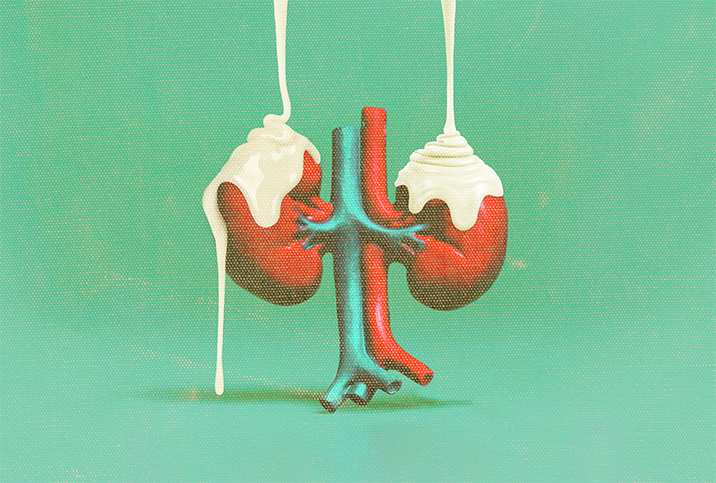Can Masturbation Contribute to ED?

Society has come a long way in terms of the topic of masturbation.
People were once told masturbation could make you go insane, cause hair to grow on the palm of your hand and even make you go blind. Anti-masturbation campaigner John Harvey Kellogg—yes, the cornflakes guy—recommended sewing the foreskin shut, electroshock, caging the genitals and circumcision without anesthesia as ways to break people of the habit.
These days, masturbation is increasingly considered self-care. About 74 percent of males masturbate, according to a Journal of the American Medical Association (JAMA) study, while 48 percent of females do. Regardless of gender, though, masturbation can offer health benefits, including reducing men's chances of developing prostate cancer.
Even today, however, some people think masturbation can cause erectile dysfunction (ED). We'll look into whether there's any truth to this and discuss some ways masturbation could possibly be connected to ED.
Does masturbation cause ED?
The short answer is no, masturbation doesn't actually cause ED.
The longer answer is that it's complicated. It is possible masturbation may at least be related to some bouts of ED, but to really understand the how and why of it requires a little teasing out.
The refractory period
One reason people might link masturbation with ED could have to do with that pesky time right after a man ejaculates: the refractory period.
"What the refractory period means is that, during that period, the man is unable to get an erection or ejaculate again," said Amy Pearlman, M.D., a men's health specialist and co-founder of Prime Institute in Fort Lauderdale, Florida. "In general, the refractory period changes with age."
The medical community doesn't really know why this phenomenon occurs, and it varies from guy to guy. We do know that as men get older, it tends to last longer. Some younger guys might only need five or 10 minutes before they're good to go again, while older men might need a full day or more.
It's possible someone who engages in a solo session before a sexual encounter with another person may not be able to perform. So, sure, masturbation might indirectly be the "cause" of his temporary ED, but not really. It's more about listening to your body and being able to gauge what works best for you.
"There are no specific recommendations on how often a person of any gender should masturbate," Pearlman said. "Some people perform better when they masturbate infrequently—or never—and others perform better with frequent masturbation. The key is trying out various masturbation schedules to see what works for each person."
The difference between porn and reality
Another frequent culprit when it comes to finding an external factor to blame for ED is pornography. The concept of porn addiction is controversial for a number of reasons. Some people see it as pathologizing another ancient custom that millions, if not billions, of people enjoy in a healthy way.
The Diagnostic and Statistical Manual (DSM-5), the so-called "bible" of the psychiatric profession, doesn't list porn addiction as a disorder.
On the other hand, plenty of people have shared stories of being unable to stop looking at porn—to the detriment of other aspects of their lives. As with so many things related to sex, maybe it just depends on the individual.
A specific link some healthcare providers identify between porn and ED is when viewing habits—and the masturbation that accompanies that viewing—are taken too far in two ways: volume and extremity. If a person endlessly watches porn of a wildly unusual nature, they may become accustomed to imagery and acts that aren't often reasonable to expect in a normal human's bedroom, leading to ED.
"A lot of young guys are getting habitually stimulated by watching porn," said Neel Parekh, M.D., a men's fertility and sexual health specialist with Cleveland Clinic. "And then when it comes to real-life experiences, they can't replicate what they're used to seeing and aren't able to perform. The theory is, the more into porn you get, the more unrealistic the type of images that are needed to get you off. But that's not what's happening in real life."
Guilt and anxiety are real, though
One more area in which masturbation and erectile function are almost certainly related is how a person feels about it. Guilt and anxiety are powerful emotions that have a real-world impact on how your body functions, including your sexual functioning.
Emotions are feelings, but they're also the result of chemical and hormonal signals our bodies send. If you're scared, anxious, stressed out—or feeling guilty—your body decides it has bigger things to deal with than sex, and the hormones needed to spark an erection won't be released.
For some people who have been taught to feel guilt and shame about masturbation, getting into sexual situations with a partner can trigger those feelings and potentially affect their performance.
"They're incredibly related," Pearlman said. "So much of our mind-body connection is not a physical problem, necessarily. We can't expect our bodies to work like that if we have these types of emotions going on.
"So when it comes to something like ED, and, let's say, something like depression or anxiety or stress or guilt, even if the blood vessels in the penis are trying to open to accommodate more blood so it can get more rigid and erect, other signals to the penis say, 'We're not going to allow you to open.'"
Conclusions
If it hasn't been said enough, masturbation is a normal, healthy activity. However, we're all different, and we all have to listen to our bodies and our inner voices to decide what's the best way for us to live.
If you have doubts or uncertainties about masturbation, don't hesitate to make an appointment with your family doctor or with a therapist. You wouldn't be the first to need a little extra support in this area.
"The mental aspect of [ED] is the most common thing I see in my practice," Parekh said. "The number one thing is counseling, talking with the patients, maybe having them talk with a sex therapist or psychologist who specializes in that area."


















